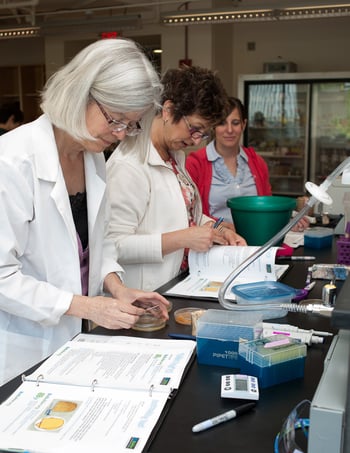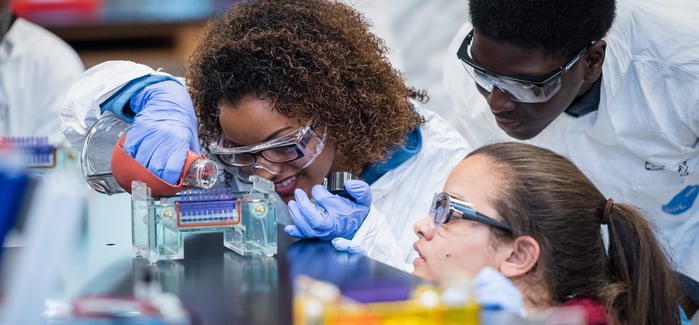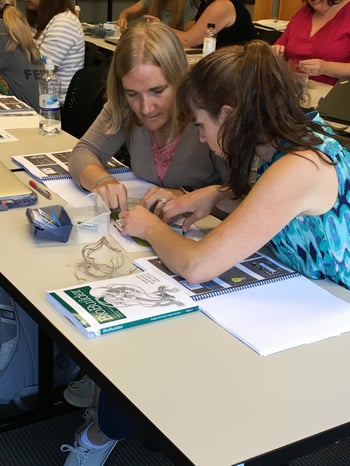 This post was contributed by Mary Tamer from BioBuilder, an innovative nonprofit bringing the study of synthetic biology into the hands of students and teachers in the U.S. and beyond.
This post was contributed by Mary Tamer from BioBuilder, an innovative nonprofit bringing the study of synthetic biology into the hands of students and teachers in the U.S. and beyond.
“I want to learn more about Synthetic Biology. Can you tell me where to start?” is a question more and more students are asking. Teachers are also asking, “How do I engage my students in real-world lab activities? I’m trying to inspire them and also keep up with all the new biotechnology.”
These are the types of inquiries that routinely hit the inbox at the BioBuilder Educational Foundation. With a goal of “bringing tomorrow’s science into today’s classrooms,” BioBuilder answers the call by offering a variety of educational programs all focused on current questions and experiments in the field of synthetic biology.
Founded as a nonprofit in 2011, BioBuilder is the brainchild of Dr. Natalie Kuldell from MIT’s Department of Biological Engineering. Built primarily from her 20 years of college teaching experience, Kuldell sought to create a program that would capitalize on the excitement found through experiential learning. “Students may forget the technical details they hear in their classes,” she said, “but they remember the moments when they discover something new for themselves and when they effectively contribute as part of a team.” As a seasoned educator, Kuldell also knew that the best days in the classroom are characterized by intense student engagement and joy, rather than a perfect lesson plan or outstanding test scores.
As a result, Kuldell launched the BioBuilder Educational Foundation in partnership with high school teachers to boost interest and understanding around the engineering of biology. Participating schools are provided with synthetic biology lab kits and lesson plans adapted from her own MIT curriculum. Drawing on current questions being asked in MIT’s research labs, BioBuilder inspires students and teachers to apply engineering principles to biological systems.
Today, what started in Cambridge with a handful of local high school teachers receiving training modules in synthetic biology has grown into a recognized name in the field of STEM education worldwide. The BioBuilder curriculum is now taught in almost every state in the U.S. and in more than 30 countries around the world.
Snapshots of the BioBuilder experience
 With its intentionally malleable curriculum, BioBuilder takes cutting-edge research projects in synthetic biology and transforms them into modules that students and teachers can investigate together. Teachers decide which BioBuilder lessons to teach, and how — some choose to run full semester-long classes, some pick and choose a few lessons to include each year; others use BioBuilder as an afterschool program or as a final project.
With its intentionally malleable curriculum, BioBuilder takes cutting-edge research projects in synthetic biology and transforms them into modules that students and teachers can investigate together. Teachers decide which BioBuilder lessons to teach, and how — some choose to run full semester-long classes, some pick and choose a few lessons to include each year; others use BioBuilder as an afterschool program or as a final project.
BioBuilder’s open-access curriculum begins with students reading comic strips and watching animations that present a specific research problem and experiment to tackle. Next it’s off to the lab, where student groups can work with one of five BioBuilder kits — which include lab materials and reagents such as droppers, centrifuge tubes, circuit parts, and lab-strains of bacteria to study — to conduct their hands-on experiments.
As a project-based curriculum, BioBuilder expands learning outcomes by emphasizing the importance of critical thinking, persistence, teamwork, and communication. And as a program focused on an emerging scientific field, BioBuilder embraces new opportunities for scientific exploration, discovery, and collaboration. One module currently under development comes from the Caltech lab of Professor Richard Murray. Murray’s lab uses cellular extracts to perform transcription and translation in vitro, and the new BioBuilder module allows students to explore how engineering fields rely on rapid prototyping to develop and test hypotheses. Students then use cellular extracts as a means to rapidly prototype DNA circuits and logic gates. This BioBuilder-Caltech collaboration has resulted in a new BioBuilder book chapter and an illustrated, downloadable classroom poster — with both of these resources road tested over the summer with dozens of teachers around the country.
How you can get involved with BioBuilder
 Details for joining BioBuilder’s programs can be found on its website (biobuilder.org) or by emailing info@biobuilder.org. Of particular interest this fall:
Details for joining BioBuilder’s programs can be found on its website (biobuilder.org) or by emailing info@biobuilder.org. Of particular interest this fall:
The BioBuilderClub
BioBuilderClub engages high school teams around the world who combine engineering approaches and scientific know-how to design/build/test their own project ideas using synthetic biology.
Launching with a kickoff meeting in October, BioBuilderClub supports teams through monthly online group meetings and newsletters, pairs teams with STEM mentors, and provides a nationally recognized platform in March to exhibit projects at any stage of completion, from pitch to prototype.
Last year’s BioBuilderClub teams’ biological engineering designs and ideas ranged from a biological breathalyzer to pesticide breakdown, production of fire-resistant housing insulation, and cleaning up salt runoff from winter icing.
BioBuilderClub is the only informal synthetic biology club of its kind, running from start to finish during the academic year and remaining affordable for all who wish to participate. All new teams, large or small, receive the BioBuilder textbook, a laboratory kit, and support during the academic year from remote scientist mentors and the BioBuilderClub community. Registration is open through October 19.
The BioBuilder Learning Lab
The BioBuilder Learning Lab is a fully equipped, state-of-the-art lab embedded in LabCentral’s community of innovators that opened in August 2017.
This flexible teaching space offers STEM programming, workshops, and customized programs to meet the needs of students and teachers. It’s possible to join a half-day workshop for teachers, to schedule a three-day training event for a local school’s Science Department, or to simply tour the lab as a starting point into further STEM exploration.Further offerings for both STEM teachers and STEM-loving students include
- The BioBuilder High School Apprenticeship, preparing local (Massachusetts), economically disadvantaged students for paid summer internships.
- A summer teacher professional development program that trains nearly 100 teachers each year, with workshops held at various locations around the U.S. (and Mexico in 2018).
- BioBuilder textbook, published by O’Reilly Media.
- BioBuilder's open-access curriculum available on Amazon Inspire.
Many thanks to our guest blogger, Mary Tamer from BioBuilder!
Mary Tamer is a Boston-based writer, editor, and consultant whose work is focused on education and education policy.
- Synthetic Biology and the Importance of Assembly Standards
- Synthetic Photobiology: Optogentics for E. coli
- Browse All Synthetic Biology Blog Posts
Resources on Addgene.org
Topics: Scientific Sharing, Education






Leave a Comment